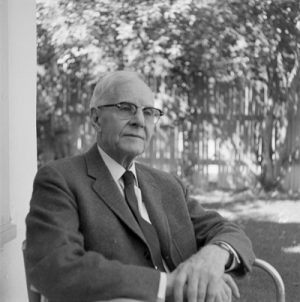Twelfth Friend: John Crowe Ransom, Bells for John Whiteside's Daughter

Today’s friend is a good Tennessean, Mr. John Crowe Ransom. Even if you don’t read much poetry, if you read a lot of Southern or political history you may recognise Mr. Ransom as one of the Southern Agrarians, a contributor to I’ll Take My Stand. Some schools will also touch on his critical ideas, since he was important to New Criticism, which, very briefly, emphasises reading literature as self-contained, without too much emphasis on the author, social background, and the like. Of course, this is mostly covered at the college level if the student is lucky. I took a course on Southern literature specifically and even there, we only touched on Mr. Ransom’s work (coincidentally, we spent more time discussing New Criticism in a course on British literature). He also edited the poetry magazine The Fugitive, and taught first at Vanderbilt University and then Kenyon College, in Ohio.
Anyway, he only wrote two volumes of poetry, but most school curricula will include at least a couple of them, including the one I memorised, “Bells for John Whiteside’s Daughter.”
There was such speed in her little body,
And such lightness in her footfall,
It is no wonder her brown study
Astonishes us all.
Her wars were bruited in our high window.
We looked among orchard trees and beyond
Where she took arms against her shadow,
Or harried unto the pond
The lazy geese, like a snow cloud
Dripping their snow on the green grass,
Tricking and stopping, sleepy and proud,
Who cried in goose, Alas,
For the tireless heart within the little
Lady with rod that made them rise
From their noon apple-dreams and scuttle
Goose-fashion under the skies!
But now go the bells, and we are ready,
In one house we are sternly stopped
To say we are vexed at her brown study,
Lying so primly propped.
One interesting thing about this poem is that, though we can gather that we’re at this girl’s funeral, Mr. Ransom never explicitly says so. In fact, without the surrounding context most of the poem is rather cheery; he starts by telling us about her having “such speed in her little body, / And such lightness in her footfall,” which sounds graceful, despite the ominous past tense. Then, a couple lines to contrast that grace with her “brown study” and the attendees’ reaction.
Then, Mr. Ransom immediately moves on to a charming and somewhat comical description of the girl making war against her shadow and a flock of geese (who probably deserve it, by the way; geese are mean bastards). These three stanzas are all pretty serious-sounding, or would be if it weren’t about a child and geese. “Bruited” is an uncommon and formal word, and “high window” instead of just a “living room window” or something makes it sound like this was happening in someplace like a palace or church; “took arms” is also formal, like Virgil singing of “Arms and a man,” and the geese cry “Alas!” like they’re in an old ballad. I like the colour imagery of “snow on the green grass,” and the pastoral sound of “noon apple-dreams.”
So, those three middle stanzas would be rather pleasant if they stood on their own, but we get that contrast in the fourth stanza with the sound of the bells and her brown study again. Presumably “we are ready” now, yet two lines later we’re “vexed” again. Basically, the funeral attendees start by thinking of the girl as she was when she was alive, but seeing her dead “Astonishes us all.” So, they comfort themselves by thinking back to her childhood adventures, feel ready, but then the sight of this apparently rambunctious girl now lying dead brings them right back to feeling vexed.
Which, I think, is very commonly how people feel when attending a wake or funeral. We first think of how the person was when he was alive, but then feel disturbed by the sight of the body. We may turn away and speak to other attendees, sharing memories of our friend or relative, which raises our spirits somewhat, only to be brought low again by the sight of the departed.
In any case, I actually memorised this poem a few years ago, and it’s one of my favourites. I’ll also mention that one thing I like about Mr. Ransom is that he sounds like a Southerner. The University of Arizona has a recording of him speaking and reciting this and other poems. This is just a personal note, but his manner of speaking reminds me of my grandfather, and in my experience not many people speak this way anymore, certainly not many young people, which is almost a sad an observation as Mr. Ransom’s poem.